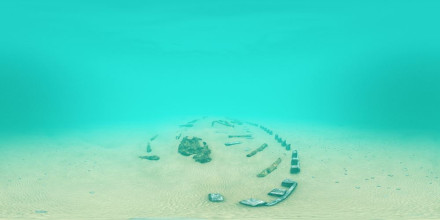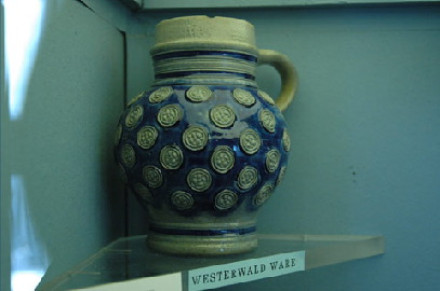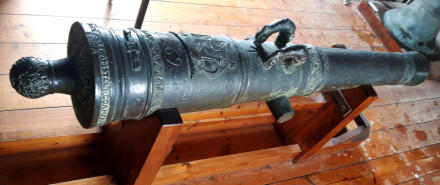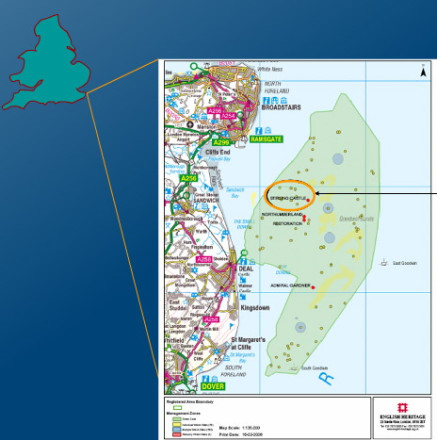History
Background
The HMS Stirling Castle was built in 1678 at Deptford as part of Samuel Pepys' regeneration of the English navy. Like the Northumberland and Restoration she was rebuild at Chatham in 1699 and she was refitted in 1701.
The Stirling Castle was part of a squadron returning from the Mediterranean which had anchored in the Downs, just off the coast of Kent, during the Great Storm of 26/27 November 1703. Along with the Northumberland, Restoration and many other vessels, the Stirling Castle was driven into the notorious Goodwin Sands and sank. Overall, 1190 lives were lost in this incident. Of the 349 crewmen of the Stirling Castle, 70 survived.
Discovery
The site was first located in 1979 when local divers from Thanet were investigating a fisherman's net that had gotten stuck. At that time the ship had been dramatically exposed by shifts in the Goodwin Sands, possibly for the first time since she was lost.



Description
Subtype: third rate.
Yard: Deptford Dockyard.
Armament: 72 guns.
![Stirling Castle 1679 [British navy]. By Willem van de Velde the Elder, 1679. A 70-gun third-rate built at Deptford and launched in 1679. It was rebuilt in 1699 and was one of three similar warships of Rear-Admiral Basil Beaumont’s squadron lost on the Goodwin Sands in the Great Storm of 1703. (The NMM also holds items recovered from modern investigation of the wreck.) Carefully and accurately executed, probably from an offset, this drawing shows the ship from before the port beam immediately after her launching. The staff amidships, where the royal standard flew at the launching, is bare; but there is a jack on the stem, an Admiralty flag forward, a Union flag aft, and an ensign. On the broadside the ship carries thirteen guns on the gun deck, thirteen on the upper deck, two each on the forecastle and poop and five on the quarterdeck. It has wreathed ports and a crowned lion figurehead. Originally inscribed ‘Jacobus te blackwall’ (?), this is crossed out, with ‘de Lense vande sterlings kastell’ written beneath (The launch of the ‘Stirling Castle’). In 1958 Robinson noted a starboard broadside view of the same ship in the collection of D.G. van Beuningen.](/photos/l/00004142.jpg)
| Master | Johnson, John |
|---|---|
| People on board | 349 |
| Length | 151 feet (46 m) |
| Beam | 40 feet (12.2 m) |
| Tonnage | 1087 ton (544 last) |
Status
After its discovery, the dynamic nature of the Goodwin Sands had exposed many artefacts which were at risk of being completely lost, which were subsequently recovered by the amateur divers. The exposed hull was remarkably well-preserved and intact, with enormous potential to provide information on the late 17th/early 18th century British navy. Because of this, the site was designated a protected wreck in 1980.
At this time the Stirling Castle was also purchased by the Isle of Thanet Archaeological Unit (now the Trust for Thanet Archaeology) but once more disappeared into the sand. In the following years the site has been periodically monitored. During the 1980s and 1990s photographs of the site were collected and a variety of geophysical techniques have been employed to study the movements of the ship. In 1998 the vessel once more began to emerge from the sand and a team was formed under the name Operation Man O' War, which carried out survey work in 1999. This survey indicated that the ship had undergone substantial movement and internal collapse.



References
- Dunkley, Mark.
Stirling Castle conservation and management plan. - Wessex Archaeology.
Striling Castle Archaeological Report. - Historic England.
Stirling Castle. - Maritime Archaeology Trust.
Stirling Castle. - Goodwin Sands Conservation Trust.
Stirling Castle.